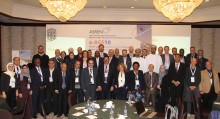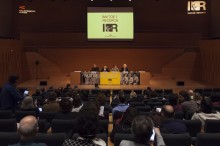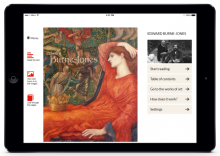-
Join the
Digital Meets Culture
Open Newsroom! If you have interesting news and events to point out in the field of digital cultural heritage, we are waiting for your contribution.
If you have interesting news and events to point out in the field of digital cultural heritage, we are waiting for your contribution.
-
Free text
-
-
Upcoming events
-

Step into the world of history and heritage through stunning 3D collections that bring the past to life. From pre-cinema artifacts in Girona to everyday objects and cultural emblems from the ancient oppidum of Bibracte in Burgundy, these collections … Continue reading →
 The deadline for submitting photographic projects for the AIPAI PHOTO CONTEST has been extended
The deadline for submitting photographic projects for the AIPAI PHOTO CONTEST has been extendedThe deadline for submitting photographic projects for the 3rd edition of the AIPAI PHOTO CONTEST, the photography contest organized by the Italian Association for Industrial Archaeological Heritage ETS, has been extended to October 31. The contest is organized in collaboration with DICEA … Continue reading →
 Brussels, November 13th and 14th, 2024
Brussels, November 13th and 14th, 2024On November 13th and 14th, OpenLab.brussels is hosting the international conference “Creating Knowledge through Participatory Research” in Brussels. The OpenLab.brussels is a joint venture of ULB-VUB dedicated to participatory research. It aims to mobilize our academic community and public or private stakeholders … Continue reading →
Area: digital heritage

Amman – Under the patronage of HE the Minister of Education, Higher Education and Scientific Research, and chaired by H E Dr. Talal Abu-Ghazaleh, the “8th International Platform on Integrating Arab e-Infrastructures in a Global Environment” and the “10th Annual … Continue reading

REvivEU is a project financed by the EU in the framework of the European Year of Cultural Heritage. The objective is to realize a series of pop-up exhibitions across 2019 in various European cities, to celebrate the diversity of European … Continue reading

During the third week of November (from 21 to 24) it was held a new edition of the Image and Research Conference, organized by the Centre for Image Research and Diffusion (CRDI) of the Girona City Council with the collaboration … Continue reading

Sponsored by Russian Ministry of Education and Science, Russian Academy of Sciences, Russian Foundation for Basic Research We are glad to announce the 15th International Conference on Parallel Computing Technologies (PaCT-2019). The Conference is to be held in Almaty, Kazakhstan, … Continue reading

We are pleased to announce that the Call for Contributions for iPRES2019 is now open. iPRES is the premier international conference on the preservation and long term management of digital materials. The 16th International Conference on Digital Preservation will be … Continue reading

The overall objective of this session, that is organized in the framework of ICT2018 research and innovation event of the Europeana Commission, intends to account for China’s “soft power” strategy and Europe’s multicultural identity and scope that puts the role of … Continue reading

Edward Burne-Jones, the catalogue accompanying the current major exhibition at Tate Britain in London, has now been digitized with Musebooks. The digital edition appears as part of a new partnership between Musebooks and the Tate to make select publications available … Continue reading

The Egyptology program in the Department of Near Eastern Languages and Cultures at Indiana University –Bloomington and the Indiana University Virtual World Heritage Laboratory, invite Egyptologists and digital humanists with interest in Egyptology to a conference in Bloomington on 29-31 … Continue reading

The Egyptology program in the Department of Near Eastern Languages and Cultures at Indiana University –Bloomington and the Indiana University Virtual World Heritage Laboratory, invite Egyptologists and digital humanists with interest in Egyptology to a conference in Bloomington on 29-30 … Continue reading
























